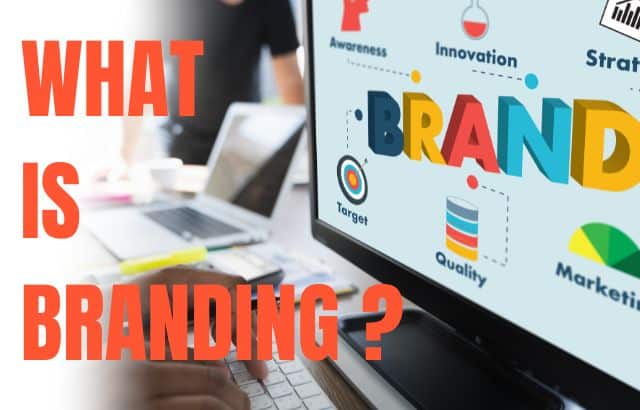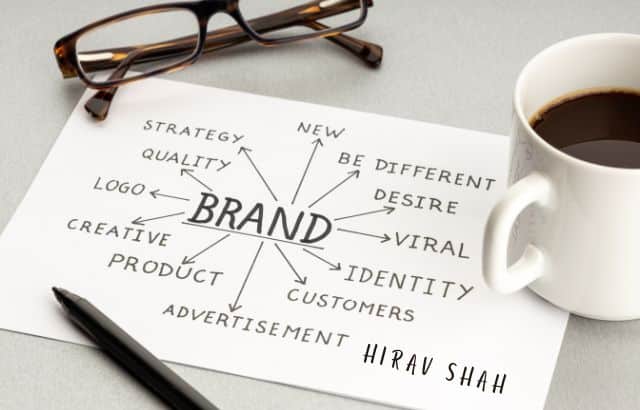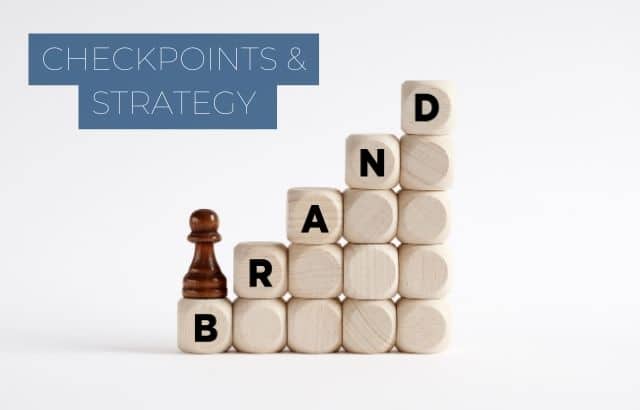Branding is important as it helps you achieve good positioning & also sets you apart from competition, says Business Strategist Hirav Shah.
Table of Contents
What is Branding ?
Branding goes way beyond just a logo or using right colors for logo or graphic element. When you think about your brand, you really want to think about your entire customer experience…everything from your logo, your website, your social media experiences, the way you answer the phone, to the way your customers experience your staff. When you look at this broad definition of branding, it can be a bit overwhelming to think about what is involved in your brand. There is some ways to make your Brand and logo.
In short, your brand is the way your customer perceives you. It is critical to be aware of your brand experience and have a plan to create the brand experience that you want to have… a good brand doesn’t just happen… it is a well thought out and strategic plan.
Many small organizations and start-ups neglect to spend necessary time thinking about their brand in this broad sense and the impact it has on their business.
Why is Branding Important ?
Branding is important as it helps you achieve good positioning in the minds of your customers and also sets you apart from your competition. Deciding not to build a brand for your business, products or services is actually detrimental to you as you easily get lost in the throng of similar people/ businesses which are in the same industry as you; unless of course yours is a monopoly business or blue ocean business idea or strategy,” says Business Strategist, Consultant, Advisor and thought leader Hirav Shah.
Also, what will be the differentiating factor for the customer in deciding between you and your competitor? It should be noted that one of the influencing factors for a customer purchasing from a particular brand is because they want to be associated with that brand, they want to have a relationship with the brand and are also willing to show it off among their peers.
It is indeed imperative for a business today to enhance its image through proactive branding.
What are the 7 reasons that Branding is important
1. Branding is Fundamental
2. Identification of Products and Organizations
3. It’s not only a name, but it represents your vision with logo
4. What to expect from your Products and customer experiences
5. Branding provides reasons to choose products or services
6. It shows mindset of services or products
7. It also helps to attract good talent
1. Branding is fundamental.
Branding is basic. Branding is essential. Building brands builds incredible value for companies and corporations.
If you are still not convinced, let me give you another example. The dollar is a world brand. In essence, it is simply a piece of paper. But branding has made it valuable.
2. Branding helps people identify and recognize products and organization
3. A brand is more than just a name, a logo design or a snazzy strap line
It is everything that encompasses your organisation and helps to set you apart from others.
For example, branding can be achieved through
a.the visual identity of the brand (logo, website and colours, are just some examples).
b. advertising and communications
c.product and packaging design
d.in-store experience
e.pricing
f.sponsoring and partnerships
4. It helps your consumers know what to expect by making your products easy-to-choose
5. Brands provide consumers with reasons to choose
Brands provide consumers with reasons to choose their products or services. A company that communicates a clear brand promise and actually constantly delivers this promise over time, will probably build a solid number of loyal customers.
6. It allows you to be clear with your organization’s strategy and stay focused.
7. Branding is the best strategy to attract top quality talent.
Employer branding is used to attract quality talent to your company and help retain your top existing employees. It helps your audience understand the “why I should work for you” in a way that showcases your organization as a great place to work.
Conclusion-Branding: The Magic Wand in Your Business Arsenal
Branding, in essence, is the story of your business: it’s how you want the world to perceive you. It’s not just a logo or a catchy tagline; it’s the complete package – the personality, values, mission, and promise your business embodies. Branding encompasses everything from the way you communicate to your design choices, to the customer experience you curate.
Why is branding important? Well, imagine two products on a shelf with similar features and prices. Which one are you more likely to pick? Probably the one with a brand that resonates with you, aligns with your values, and promises a positive experience. That’s the power of branding!
Here is a conclusive summary jotted down by Hirav Shah of key reasons why branding is crucial for your business:
1. Stands Out from the Crowd: In a sea of competitors, a strong brand helps you differentiate yourself and capture attention. It makes you memorable and gives customers a reason to choose you over others.
2. Builds Trust and Credibility: A consistent and well-defined brand tells your target audience who you are and what you stand for. This fosters trust and makes them more likely to do business with you.
3. Commands Premium Pricing: A strong brand allows you to command premium pricing for your products or services. Customers perceive branded products as higher quality and are willing to pay more for them.
4. Attracts and Retains Talent: A strong employer brand attracts and retains top talent. People want to work for companies they admire and identify with.
5. Boosts Customer Loyalty: Branding fosters customer loyalty by creating an emotional connection. Customers become attached to your brand and its values, leading to repeat business and positive word-of-mouth.
In a nutshell, branding is an investment in your business’s future. It’s not just about aesthetics; it’s about building a lasting relationship with your target audience and achieving sustainable success. So, invest in crafting a powerful brand story, and watch your business rise above the competition!
Yet, uncertainty remains today in many parts of the country. In some states, businesses have reopened in recent weeks only to be told to close or reduce their capacity for customers. It’s becoming increasingly challenging to plan for the future. Consequently, many business owners and leaders might wonder how they can develop a growth strategy for the future.
“What you need is a strategic direction to provide purpose for your business and help you set realistic goals to accomplish in this year”. Quotes Hirav Shah, Famed Astro-Strategist Cum Business Astrologer.
For Businesses (small, medium and large) -It is always great to have a little heads-up and get an idea of what future will bring with it and also how to go about it. That is where the Astro-Strategic Analysis helps.
“Only An Astro-Strategic analysis will provide you the momentum you eagerly want in your business and career ”, Concludes Hirav Shah, Leading Astro-Strategist and Business Astrologer.































